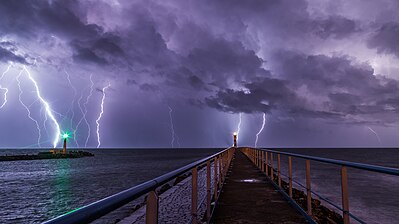Lightning is a natural phenomenon formed by electrostatic discharges through the atmosphere between two electrically charged regions, either both in the atmosphere or one in the atmosphere and one on the ground, temporarily neutralizing these in a near-instantaneous release of an average of between 200 megajoules and 7 gigajoules of energy, depending on the type. The three main types of lightning are distinguished by where they occur: either inside a single thundercloud (intra-cloud), between two clouds (cloud-to-cloud), or between a cloud and the ground (cloud-to-ground), in which case it is referred to as a lightning strike. Lightning causes thunder, a sound from the shock wave which develops as gases in the vicinity of the discharge heat suddenly to very high temperatures. It is often heard a few seconds after the lightning itself. Thunder is heard as a rolling, gradually dissipating rumble because the sound from different portions of a long stroke arrives at slightly different times. This photograph shows strokes of cloud-to-ground lightning hitting the Mediterranean Sea close to Port-la-Nouvelle in southern France.Photograph credit: Maxime Raynal
